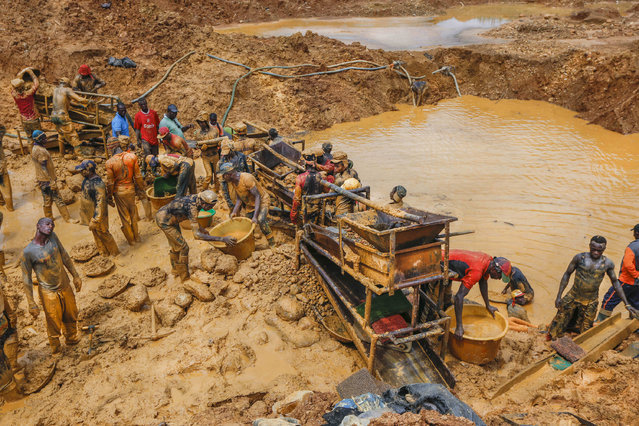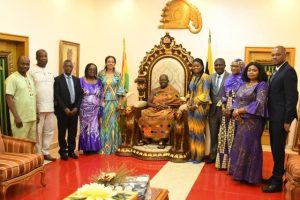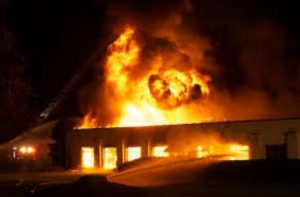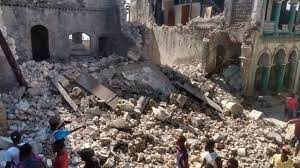The Minister of Lands and Natural Resources, Mr Samuel Abu Jinapor, has stated that the fight against illegal mining, popularly known as galamsey, is not a “nine-day wonder”.
He said it would be sustained to ensure preservation of all rivers in the country, especially those badly affected by illegal mining activities.
“We will not stop until we see our water bodies with aquatic life back to normal and the water flowing freely to the intake points of the Ghana Water Company Ltd for treatment,” Mr Jinapor said in an interview with the Daily Graphic.
He described as encouraging, the gradual restoration of the Ankobra River to its natural state following the activities of ‘Operation Halt’ to rid all river bodies of illegal mining activities.
Mr Jinapor stated that the current turbidity level of the Ankobra River and other water bodies that were affected by illegal mining had improved as a result of the ongoing anti-galamsey campaign led by the ministry and the Ghana Armed Forces (GAF).
The minister was commenting on a report in the Daily Graphic, titled “Ankobra River regaining quality” which was published on Tuesday, May 25, this year.
The story captured observations by the Daily Graphic that the Ankobra, as well as some of its tributaries, which had turned muddy due to mining activities, was beginning to regain quality.
Commitment
The Lands and Natural Resources Minster noted that President Nana Addo Dankwa Akufo-Addo was committed to efforts to restore all the polluted rivers and would not relent in using all legitimate means to ensure that miners stayed away from river bodies and restricted mining zones.
He explained that due to the support of President Akufo-Addo, the ministry and all the municipal, metropolitan and district assemblies in affected communities had also committed to the fight, saying, “they will not let the country down.”
Mr Jinapor said under the leadership of President Akufo-Addo, the impunity with which some persons entered restricted forest reserves and rivers to dig for precious minerals would be a thing of the past.
He stated that the clamping down on such activities would only be intensified rather than abandoned as some people deeply involved in such illegal activities were proclaiming.
Sustainability
Mr Jinapor said the existence of all citizens in the country would be threatened by the activities of illegal miners if the fight was not sustained.
He said the destruction of water bodies and forest reserves were evil activities that had the tendency of depriving future generations the right to enjoy a green environment conducive for their health.
Economic benefits
However, the minister noted that mining was an economically important venture that had to be guided by the law.
Fortunately, the country was blessed with many water bodies and green reserves which were the envy of other countries and had to be preserved for the benefit of the future generation, Mr Jinapor noted.
“Let me say that the government deems mining as very important but it must be done responsibly; we have several interventions and we will want people interested in mining to avail themselves rather than resort to the illegalities,” Mr Jinapor advised.
He commended the various mining communities for their support for Operation Halt.
Background
The government announced the commencement of the fourth phase of the renewed anti-galamsey fight, ‘Operation Halt’.
Four hundred and one military officers have been deployed for the new phase which focuses on illegal mining activities on water bodies, particularly, River Ankobra, in the Western Region.
“The Ghana Armed Forces has commenced the fourth phase of Operation Halt II, aimed at removing all persons and logistics involved in mining from water bodies,” a statement from the Information Ministry said on Thursday, May 27, this year.
“The new phase of the operation focuses on the Ankobra River and its tributaries. The operation is being undertaken by 401 men of all ranks,” it said.
The Information Minister, Mr Kojo Oppong Nkrumah, who signed the statement, advised the public to stay away from mining in water bodies to avoid any action by the forces.
Operation Halt
The first phase of Operation Halt focused on the Pra River, but this time attention was along the Pra in the Central Region, and not the Western Region.
The second phase was in the Ashanti Region, with a focus on the Oda River and the River Offin in the Ashanti and Central regions.
Phase Three focused on River Ayensu and Birim in the Eastern Region.
Equipment destroyed
The Operation Halt task force has so far destroyed 49 excavators, 228 changfans and 87 water pumping machines, among other mining equipment.







